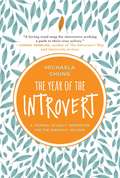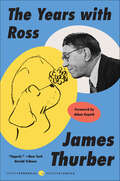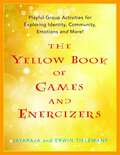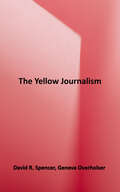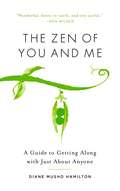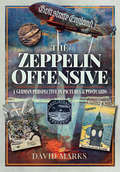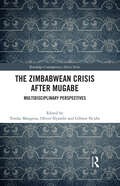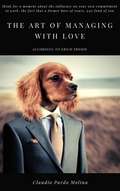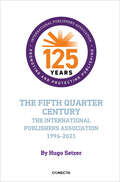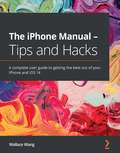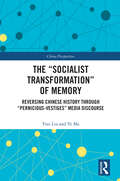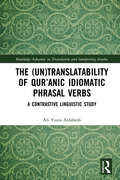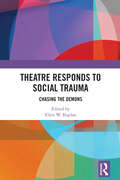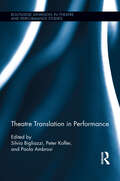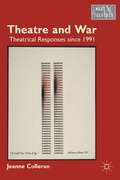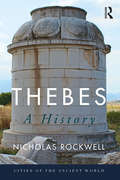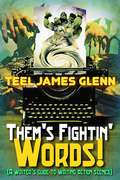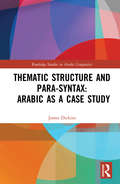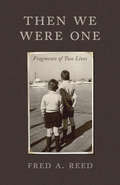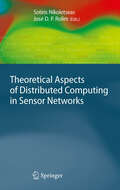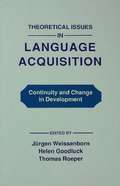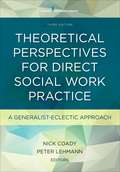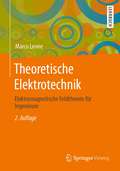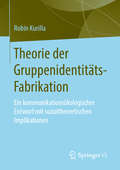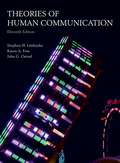- Table View
- List View
The Year of the Introvert: A Journal of Daily Inspiration for the Inwardly Inclined
by Michaela Chung365 quotes, insights, and journaling prompts for the blossoming introvert.The Year of the Introvert is a seasonal daybook and journal that takes introverts on a true adventure in introspection and self-care, 365 days of the year. With each page of daily insight, Michaela Chung provides an interactive roadmap for introverts who wish to embrace who they are and live a fulfilling—and powerful!—life on their own quiet terms. Within these pages, you’ll discover quotes, prompts, and inspirational essays to propel you toward greater self-awareness, and self-love. Along the way, you’ll receive daily morsels of wisdom to strengthen your relationships, develop authentic confidence, survive the holidays, and truly blossom in your own introverted way. Ask introspective questions to awaken your inner adventurerGet tips on how to love your introversion and yourselfLearn how to cut through small talk and truly connectBe quietly magnetic in your romantic relationshipsBuild cozy living spaces that will replenish your energyAnd more!The Year of The Introvert is the ideal introvert’s companion for navigating the challenges and joys of being an introvert in an extrovert’s world. Reflect on your quiet strengths, water your natural wellspring of creativity, and take ownership of your “innie” life!
The Years with Ross
by James ThurberFrom iconic American humorist James Thurber, a celebrated and poignant memoir about his years at The New Yorker with the magazine’s unforgettable founder and longtime editor, Harold Ross“Extremely entertaining. . . . life at The New Yorker emerges as a lovely sort of pageant of lunacy, of practical jokes, of feuds and foibles. It is an affectionate picture of scamps playing their games around a man who, for all his brusqueness, loved them, took care of them, pampered and scolded them like an irascible mother hen.” —New York TimesWith a foreword by Adam Gopnik and illustrations by James ThurberAt the helm of America’s most influential literary magazine from 1925 to 1951, Harold Ross introduced the country to a host of exciting talent, including Robert Benchley, Alexander Woollcott, Ogden Nash, Peter Arno, Charles Addams, and Dorothy Parker. But no one could have written about this irascible, eccentric genius more affectionately or more critically than James Thurber, whose portrait of Ross captures not only a complex literary giant but a historic friendship and a glorious era as well. "If you get Ross down on paper," warned Wolcott Gibbs to Thurber," nobody will ever believe it." But readers of this unforgettable memoir will find that they do.Offering a peek into the lives of two American literary giants and the New York literary scene at its heyday, The Years with Ross is a true classic, and a testament to the enduring influence of their genius.
The Yellow Journalism: The Press and America's Emergence as a World Power
by David R. SpencerWhen a case containing dismembered human remains surfaced in New York's East River in June of 1897, the publisher of the New York Journal--a young, devil-may-care millionaire named William Randolph Hearst--decided that his newspaper would "scoop" the city's police department by solving this heinous crime. Pulling out all the stops, Hearst launched more than a journalistic murder investigation; his newspaper's active intervention in the city's daily life, especially its underside, marked the birth of the Yellow Press. <p><p>In a work that studies the rise and fall of this phenomenon, David R. Spencer documents the fierce competition that characterized yellow journalism, the social realities and trends that contributed to its success (and its ultimate demise), its accomplishments for good or ill, and its long-term legacy. Most notable among Hearst's competitors was New York City's The World, owned and managed by a European Jewish immigrant named Joseph Pulitzer. The Yellow Journalism describes how these two papers and others exploited the scandal, corruption, and crime among the city's most influential citizens, and its most desperate inhabitants--a policy that made this "journalism of action" remarkably effective, not just as a commercial force, but also as an advocate for the city's poor and defenseless. <p><p>Spencer shows how many of the innovations first introduced during this period--from investigative reporting to the use of color, entertainment news, and cartoons in papers--have had a lasting effect on journalism; and how media in our day reflects the Yellow Press's influence, but also its threatened irrelevance within the broader realities of contemporary society.
The Zen of You and Me: A Guide to Getting Along with Just About Anyone
by Diane Musho HamiltonHow to deal with interpersonal conflict--from a Zen perspective.The people who get under your skin the most can in fact be your greatest teachers. It’s not a matter of overlooking differences, as is often taught, but of regarding those difficult aspects of the relationship with curiosity and compassion--for those very differences offer a path to profound connection. Diane Hamilton’s practical, reality-based guide to living harmoniously with even your most irritating fellow humans—spouses, partners, colleagues, parents, children--shows that “getting along” is really a matter of discovering that our differences are nothing other than an expression of our even deeper shared unity.
The Zeppelin Offensive: A German Perspective in Pictures and Postcards
by David MarksAirship propaganda that&’s &“a visual treat . . . it will appeal to all those interested in how artwork was harnessed to convey information in time of war&” (Firetrench). Books on the Zeppelin raids during the First World War have, traditionally, focused on the direct impact of Britain, from the devastating effects on undefended towns and cities, the psychological impact of this first weapon of total war to the technological and strategic advances that eventually defeated the &“Baby Killers.&” Now, drawing on the largest postcard collection of its kind and other period memorabilia, David Marks tells the story of the Zeppelin during the First World War from a viewpoint that has rarely been considered: Germany itself. From its maiden flight in July 1900, the Zeppelin evolved into a symbol of technology and national pride that, once war was declared, was at the forefront of German&’s propaganda campaign. The Zeppelin links the rampant xenophobia at the outbreak of the conflict against England (it almost never was called Britain), France, Russia and their allies to the political doctrines of the day. The postcards that profusely illustrate this book show the wide-ranging types of propaganda from strident Teutonic imagery, myths and legends, biting satire and a surprising amount of humor. This book is a unique contribution to our understanding of the place of the Zeppelin in Germany&’s culture and society during the First World War. &“Well-recommended for its unique visual and psychological insights.&” —Over the Front &“Perfectly conveys the early optimism of the Zeppelin as both a symbol of national prestige and the weapon which would win the War.&” —Donna&’s Book Blog
The Zimbabwean Crisis after Mugabe: Multidisciplinary Perspectives (Routledge Contemporary Africa)
by Tendai MangenaThis book examines the ways in which political discourses of crisis and ‘newness’ are (re)produced, circulated, naturalised, received and contested in Post-Mugabe Zimbabwe. Going beyond the ordinariness of conventional political, human and social science methods, the book offers new and engaging multi-disciplinary approaches that treat discourse and language as important sites to encounter the politics of contested representations of the Zimbabwean crisis in the wake of the 2017 coup. The book centres discourse on new approaches to contestations around the discursive framing of various aspects of the socio-economic and political crisis related to significant political changes in Zimbabwe post-2017. Contributors in this volume, most of whom experienced the complex transition first-hand, examine some of the ways in which language functions as a socio-cultural and political mechanism for creating imaginaries, circulating, defending and contesting conceptions, visions, perceptions and knowledges of the post-Mugabe turn in the Zimbabwean crisis and its management by the "New Dispensation". This book will be of interest to scholars of African studies, postcolonial studies, language/discourse studies, African politics and culture.
The art of managing with love, according to Erich Fromm
by Claudio Pardo MolinaBOOK DESCRIPTION This book delivers practical advice to manage people and teams into a business. Managers constantly have to deal with emotions- love and even fear, of the teams they lead, without necessarily having any academic training to respond to these challenges. In light of such argument, I wrote this book with a series of recommendations to take decisions based on the book “The Art of Loving,”by the renowned philosopher and psychologist Erich Fromm, born in 1900 in Germany.
The fifth quarter century: The International Publishers Association 1996-2021
by Hugo SetzerTHE INTERNATIONAL PUBLISHERS ASSOCIATION IPA) is the world's largest federation of national, regional and specialist publishers' associations. Through its members, IPA represents thousands of individual publishers around the world who service markets containing more than 5.6 billion people. Based in Geneva, Switzerland, IPA represents the interests of the publishing industry in international fora and wherever publishers' interests are at stake.
The iPhone Manual - Tips and Hacks: A complete user guide to getting the best out of your iPhone and iOS 14
by Wallace WangDiscover customization and productivity tips with this quick guide for iPhone usersKey FeaturesLearn everything about your iPhone quickly to use it as an effective tool for communication, entertainment, and workCustomize your phone's look and sound and modify the iOS's privacy settingsKeep your apps tidy and organized using the App LibraryBook DescriptionThe iPhone is the most popular smartphone available on the market, renowned for its sophisticated design, immersive UI, and user safety. And even if you've bought an iPhone for its impressive specifications, you may still be unaware of many of its features, which you'll discover with the help of this book!The iPhone Manual is your practical guide to uncovering the hidden potential of iPhones, and will leave you amazed at how productive you can be by learning tips and hacks for customizing your device as a communication, entertainment, and work tool. You'll unearth the complete range of iPhone features and customize it to streamline your day-to-day interaction with your device. This iPhone manual will help you explore your iPhone's impressive capabilities and fully understand all the features, functions, and settings that every iPhone owner should know. With this book, you'll get to grips with not only the basics of communication but also best practices for accessing photos, videos, and music to set up your entertainment using your iPhone. In addition to this, you'll learn about serious work tools that will make you productive in your everyday tasks.By the end of this iPhone book, you'll have learned how to use your iPhone to perform tasks and customize your experience in ways you probably didn't realize were possible.What you will learnUse touch gestures and understand the user interface to use any app on the iPhoneExplore the latest apps exclusive to iOS 14, such as the translate and magnifier appsFind out how to share data from your iPhone with other devicesSet up and customize Siri and learn how to give commandsDiscover different ways to capture and access pictures and videosSet up an email account and use multiple accounts on a single deviceSet up FaceTime on your iPhone and discover different ways to make a FaceTime callUse Apple Pay to shop online or send money to other usersWho this book is forThe book is for iPhone users who want to get more out of their state-of-the-art iPhone device and the powerful iOS interface. If you are new to using smartphones or are an Android user new to iPhones, this book will help you migrate efficiently.
The “Socialist Transformation” of Memory: Reversing Chinese History through “Pernicious-Vestiges” Media Discourse (China Perspectives)
by Yusi Liu Ye MaThrough discourse analysis and historical comparison of "Pernicious Vestiges" (Yí Dú/遗毒) narrative in the news text of People’s Daily, this book is devoted to revealing its primary metaphors and political functions in China. "Pernicious Vestiges" (Yí Dú/遗毒) is one of the most frequently used words in contemporary Chinese historical narration, as well as a constantly changing rhetorical direction in new China's media discourse, whose function is to remold memory. Over the past 76 years, the "Pernicious Vestiges" narrative continuously constructed by People’s Daily, the official newspaper of the CPC Central Committee, reflects the views of China’s political elite and represents the ruling party's evaluation and re-evaluation of historical events. The findings of this book challenge the myth that memory is naturally superior to forgetting, reflect on the ethics of memory in "Pernicious Vestiges" narratives and the erasure of their own justice, and suggest that the critical space compressed by "Pernicious Vestiges" narratives should be returned to restore the order of memory and historical reflection. This book will be an excellent read for students and scholars of Chinese studies, media studies, and those who are interested in political communication and collective memory in general.
The: A Contrastive Linguistic Study (Routledge Advances in Translation and Interpreting Studies)
by Ali Yunis AldaheshQur’anic idiomaticity, in its all aspects, poses a great deal of challenge to Qur’an readers, learners, commentators, and translators. One of the most challenging aspects of Qur’anic idiomaticity is Qur’anic idiomatic phrasal verbs, where significances of proper Arabic verbs are entirely fused with significances of prepositions following them to produce new significances that have nothing to do with the basic significances of those verbs and prepositions. By examining a corpus of ten of the most influential English translations of the Qur’an, this study scrutinizes how some translators of the Qur’an have dealt with the phenomenon of Qur’anic idiomatic phrasal verbs, the difficulties that they have encountered when translating them into English, and the strategies that they have employed in their attempts to overcome the inherent ambiguity of such expressions and provide their functional-pragmatic equivalents for English readership. The study proposes a working model for analysing and assessing the translation of the Qur’anic idiomatic phrasal verbs and provides a number of theory-based recommendations for translators in general and Qur’an translators in particular.
Theatre Responds to Social Trauma: Chasing the Demons (Routledge Series in Equity, Diversity, and Inclusion in Theatre and Performance)
by Ellen W. KaplanThis book is a collection of chapters by playwrights, directors, devisers, scholars, and educators whose praxis involves representing, theorizing, and performing social trauma.Chapters explore how psychic catastrophes and ruptures are often embedded in social systems of oppression and forged in zones of conflict within and across national borders. Through multiple lenses and diverse approaches, the authors examine the connections between collective trauma, social identity, and personal struggle. We look at the generational transmission of trauma, socially induced pathologies, and societal re-inscriptions of trauma, from mass incarceration to war-induced psychoses, from gendered violence through racist practices. Collective trauma may shape, protect, and preserve group identity, promoting a sense of cohesion and meaning, even as it shakes individuals through pain. Engaging with communities under significant stress through artistic practice offers a path towards reconstructing the meaning(s) of social trauma, making sense of the past, understanding the present, and re-visioning the future.The chapters combine theoretical and practical work, exploring the conceptual foundations and the artists’ processes as they interrogate the intersections of personal grief and communal mourning, through drama, poetry, and embodied performance.
Theatre Translation in Performance (Routledge Advances in Theatre & Performance Studies #29)
by Silvia Bigliazzi Peter Kofler Paola AmbrosiThis volume focuses on the highly debated topic of theatrical translation, one brought on by a renewed interest in the idea of performance and translation as a cooperative effort on the part of the translator, the director, and the actors. Exploring the role and function of the translator as co-subject of the performance, it addresses current issues concerning the role of the translator for the stage, as opposed to the one for the editorial market, within a multifarious cultural context. The current debate has shown a growing tendency to downplay and challenge the notion of translational accuracy in favor of a recreational and post-dramatic attitude, underlying the role of the director and playwright instead. This book discusses the delicate balance between translating and directing from an intercultural, semiotic, aesthetic, and interlingual perspective, taking a critical stance on approaches that belittle translation for the theatre or equate it to an editorial practice focused on literality. Chapters emphasize the idea of dramatic translation as a particular and extremely challenging type of performance, while consistently exploring its various textual, intertextual, intertranslational, contextual, cultural, and intercultural facets. The notion of performance is applied to textual interpretation as performance, interlingual versus intersemiotic performance, and (inter)cultural performance in the adaptation of translated texts for the stage, providing a wide-ranging discussion from an international group of contributors, directors, and translators.
Theatre and War
by Jeanne ColleranHow has the media since the First Gulf War altered political analysis and how has this alteration has in turn affected socially-critical art? Colleran examines more than forty plays, many written in direct response to the 1991 war in Iraq as well as to the 9/11 attacks and the retaliatory actions in Iraq and Afghanistan.
Thebes: A History (Cities of the Ancient World)
by Nicholas RockwellThebes offers a scholarly survey of the history and archaeology of the city, from 1600 BCE – 476 CE. Discussions of major developments in politics, war, society and culture form the basis of a chronological examination of one of Greece’s most powerful and dynamic cities. By taking a broad view, the book’s account speaks to larger trends in the ancient Mediterranean world while also demonstrating how Thebes was unique in its ancient context. It provides an up-to-date examination of all available information: topographic, demographic, numismatic, epigraphic, archaeological and textual discussions provide the most complete, current picture of ancient Thebes and illustrate the value of an interdisciplinary approach.
Them's Fightin' Words
by Teel James GlennJoin professional fight choreographer Teel James Glenn as he takes you on a journey through the process of creating believable and dramatic action scenes in every kind offiction. Using wit and personal experience, he dissects action scenes for the keys to what makes them work. Readers benefit from his combat experience, including eastern martial arts, the physiology and kinetics of weight training and the dramatic story telling from film and stage acting. From fantasy swordfights, barroom brawls, comic combat to martial arts knockabouts, he not only outlines and explains the whys and wherefores of literary violence, he also explores techniques that allow you to create them yourself with a series of fun and easy to do exercises. He takes the mystery out of writing action, but not the excitement!
Thematic Structure and Para-Syntax: Arabic As A Case Study (Routledge Studies in Arabic Linguistics)
by James DickinsThematic Structure and Para-Syntax: Arabic as a Case Study presents a structural analysis of Arabic, providing an alternative to the traditional notions of theme and rheme. Taking Arabic as a case study, this book claims that approaches to thematic structure propounded in universalist linguistic theories, of which Hallidayan systemic functional linguistics is taken as an illustrative example, are profoundly wrong. It argues that in order to produce an analysis of thematic structure and similar phenomena which is not undermined by its own theoretical presuppositions, it is necessary to remove such notions from the domain of linguistic and semiotic theory. The book initially focuses on Sudanese Arabic, because this allows for a beautifully clear exposition of general principles, before applying these principles to Modern Standard Arabic, and some other Arabic varieties. This book will be of interest to scholars in Arabic linguistics, linguistic theory, and information structure.
Then We Were One
by Fred A. ReedSouthern California in the late 1950s has the look and feel of a midsummer morning-bright and still. For two young brothers, the wide world is full of promise. Together they set out to explore it as one, ever alert to the sound of their mother's whistle calling them home. But by late afternoon, dark clouds gather on the horizon and the storm soon breaks.That storm is the war in Vietnam, and its fury sweeps away all the noble lies of the social conservatism their parents endorsed.Then, in a bookstore on Hollywood Boulevard, the eldest son happens upon a novel by Kazantzakis that entices him to Greece. There, he learns the language, and in that ancient land that has seen it all, heard it all, and done it all, he encounters militant Cretan students and the woman who will become his life partner in exile.But for the younger brother there will be no escape. Trapped by failed marriages, smothered by parental guidance and an education system exposed as the state's recruiting agent, he is dispatched to Vietnam. Fifteen years later he lies buried on a lonely hillside in New Zealand, dead of the wounds he sustained in that war.Shocked by the death of his younger brother, Fred Reed sets out on a series of journeys of discovery and understanding. By way of Iran in the aftermath of the Islamic Revolution; the Anatolian highlands of the mystic Bediuzzaman Said Nursi; in pursuit of ancient and modern iconoclasts in Syria and Lebanon; he comes under the spell of Islam. In its embrace he finds a renewed brotherhood; in its discipline, liberation.Then We Were One challenges us with its conclusion that indictment, absolution and redemption, though we must seek them, are not ours to ultimately possess.
Theoretical Aspects of Distributed Computing in Sensor Networks
by José D.P. Rolim Sotiris NikoletseasWireless ad hoc sensor networks has recently become a very active research subject. Achieving efficient, fault-tolerant realizations of very large, highly dynamic, complex, unconventional networks is a real challenge for abstract modelling, algorithmic design and analysis, but a solid foundational and theoretical background seems to be lacking. This book presents high-quality contributions by leading experts worldwide on the key algorithmic and complexity-theoretic aspects of wireless sensor networks. The intended audience includes researchers and graduate students working on sensor networks, and the broader areas of wireless networking and distributed computing, as well as practitioners in the relevant application areas. The book can also serve as a text for advanced courses and seminars.
Theoretical Issues in Language Acquisition: Continuity and Change in Development
by Helen Goodluck Thomas Roeper Jürgen WeissenbornIn recent linguistic theory, there has been an explosion of detailed studies of language variation. This volume applies such recent analyses to the study of child language, developing new approaches to change and variation in child grammars and revealing both early knowledge in several areas of grammar and a period of extended development in others. Topics dealt with include question formation, "subjectless" sentences, object gaps, rules for missing subject interpretation, passive sentences, rules for pronoun interpretation and argument structure. Leading developmental linguists and psycholinguists show how linguistic theory can help define and inform a theory of the dynamics of language development and its biological basis, meeting the growing need for such studies in programs in linguistics, psychology, and cognitive science.
Theoretical Perspectives for Direct Social Work Practice: A Generalist-Eclectic Approach
by Nick Coady Peter Lehmann<p>This expanded third edition of a popular textbook provides a completely revised and updated overview of the theories, models, and therapies that inform direct social work practice. The text is grounded in generalist social work principles and values and promotes a problem-solving model of social work practice as a framework for the eclectic use of theory, as well as for integrating the artistic, reflective elements of practice. It provides in-depth coverage of select psychodynamic, cognitive-behavioral, humanistic, critical, and postmodern theories. <p>The third edition features a new section on Critical Theories, where a new chapter on Empowerment Theory is included with a completely revised chapter on Feminist Theory. A new chapter on Strengths-based Social Work has been added to the section on meta-theories for social work practice. Other new chapters include Emotion-focused Therapy and Collaborative Therapy. These revisions are based on suggestions from an extensive survey of professors.</p>
Theoretische Elektrotechnik: Elektromagnetische Feldtheorie für Ingenieure
by Marco LeoneAm Anfang des Buches wird die allgemeine Maxwell’sche Theorie elektromagnetischer Felder und ihre Unterteilung für die unterschiedlichen Problemstellungen ausführlich dargestellt. Auf die Verbindung zwischen Feldtheorie und der elektrischen Netzwerke wird ausführlich eingegangen. Der methodische Schwerpunkt liegt in der Aufstellung und Lösung grundlegender Randwertprobleme der Elektro- und Magnetostatik, zeitabhängiger Diffusionsfelder in elektrischen Leitern sowie Wellenfelder im Freiraum, entlang von Leitungen und in Hohlräumen. Dabei wird auf die Einheitlichkeit der übergeordneten Lösungsmethodik besonders Wert gelegt, sodass das einmal Erlernte auf andere Problemstellungen übertragen werden kann. Ausführliche Rechenbeispiele und zusätzliche Übungsaufgaben mit Lösungen dienen zur Vertiefung und Klausurvorbereitung. Die dafür benötigten mathematischen Formeln der Vektoralgebra, Koordinatensysteme und der Vektoranalysis sind in einem Anhang zum Nachschlagen zusammengestellt.
Theorie der Gruppenidentitäts-Fabrikation: Ein kommunikationsökologischer Entwurf mit sozialtheoretischen Implikationen
by Robin KurillaBisher gibt es keine umfassende und kohärente Annäherung an die Bestimmung der an der Konstruktion von Gruppenidentitäten beteiligten kommunikativen und präkommunikativen Prozesse. Die vorliegende Untersuchung schließt diese Lücke durch die Entwicklung einer einheitlichen theoretischen Grundlage, mit der sich empirische Konstruktionsprozesse erfassen lassen. Überdies leistet sie einen Beitrag zur Domäne der Gruppenkommunikationsforschung. Es wird ein grundlagentheoretisches Flussbett geschaffen, das eine begriffliche Fundierung der Konzeption von Inter- und Intragruppenkommunikation liefert, die nicht von ‚objektiven’ Kategorien ihren Ausgang nimmt, sondern von de facto stattfindenden Vergesellschaftungsprozessen. Zudem wird am Beispiel der Gruppenidentitätskonstruktion die Architektur einer innovativen Sozialtheorie vorgestellt, die den Ansprüchen kommunikationswissenschaftlicher und womöglich auch in anderen Disziplinen zu verortender Erkenntnisinteressen genügt.
Theories Of Human Communication
by Stephen W. Littlejohn Karen A. Foss John G. OetzelFor over forty years, Theories of Human Communication has energized classroom learning. John Oetzel joined the team of Stephen Littlejohn and Karen Foss, adding his expertise in intercultural, health, and organizational communication. The extensively updated edition is organized around two themes: elements of the basic communication model (communicator, message, medium, and "beyond" human communication) and communication contexts (relationship, group, organization, health, social media, culture, and society). A new chapter discusses frameworks by which theories can be organized, revealing how they contribute to and are impacted by larger issues about the nature of inquiry.
